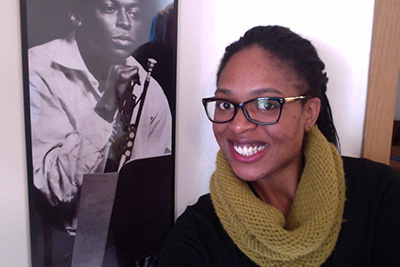It’s been quite a spring for Noaquia Callahan, a doctoral student in history who has earned 10 competitive grants and fellowships for the 2015-16 academic year.
- Doctoral Fellow in African American History, German Historical Institute in Washington D.C.
- Marcus Bach Graduate Fellowship; College of Liberal Arts and Sciences, The University of Iowa
- Mellon-Moorland Travel to Collections Grant; Moorland-Springarn Research Center, Howard University in Washington D.C.
- Jane A. Weiss Dissertation Scholarship; Gender, Women, and Sexuality Studies Department, The University of Iowa
- Lawrence E. Gelfand Fellowship; History Department, The University of Iowa
- Fellow, Humanities Without Walls Pre-Doctoral Summer Workshop
- Iowa Graduate Success External Fellowship Award; Graduate College, The University of Iowa
- Research Grant; Graduate and Professional Student Government, The University of Iowa
- Supplementary Travel Award for Research; Graduate College, University of Iowa
- Research Award from the Carrie Chapman Catt Center for Women and Politics; Iowa State University
“The Graduate Student Success Staff taught me how to breakdown and tailor my proposals according to each grant funder’s mission, grant description, and requirements,” says Callahan. “Developing this skill is key to success in the world of grant writing.”

Interview with Callahan
Q: You were a Summer Research Opportunities Program (SROP) scholar here at the UI. How was that experience?
A: There was a sense of community here. There was a sense that we all came here wanting to learn about graduate school. It was an amazing opportunity that rarely comes along. There was a positive vibe that we were going to do this together. The SROP program was good prep (for graduate school) because it was intense. Having to produce quality research required intense concentration and work ethic.
The reason the University of Iowa was at the top of my list is that Joe (Henry) and Diana (Sproles) stayed in contact with me. If I had questions during the graduate application process, I could follow up with them. If they didn’t know the answer, they connected me with someone who could help. There was a consistent care to help you succeed.
Q: How have your UI graduate advisors, Leslie Schwam and Elizabeth Heinemann, assisted you?
A: They challenged me and had high expectations, but they also helped me get there. When I needed to slow down when this was too much, they let me step back for a second, then we went back at it.
Q: Please describe your dissertation topic.
A: I study early 20th century international feminist organizing in African American and German history. I use the story of Mary Church Terrell’s life to pull big issues together.
Mary Church Terrell is representative of the challenges of being African American and being a woman at the turn of the 20th century. In Berlin in 1904, she delivered a speech in German called “The Progress of Colored Women.” She was able to present African-American women in a way that the world didn’t know, challenging some of the negative stereotypes of women of color.
And she’s also able to connect with these women based on the fact that she’s a woman and faces challenges similar to the challenges they face. She argues that the issues of racism and sexism are not exclusive. As African-American women, we deal with both of these simultaneously. For us, they are intertwined.